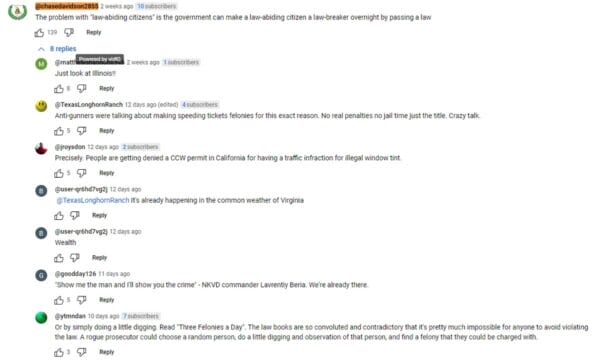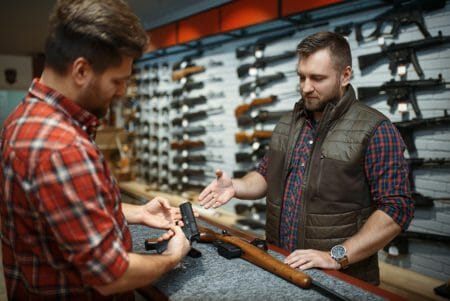In a groundbreaking decision, the 9th Circuit Court of Appeals sided with felon gun owners in the case of United States v. Duarte, overturning a federal law that prohibited felons, including non-violent offenders, from possessing firearms. This decision, which has stirred significant controversy, is seen as a victory by many Second Amendment advocates.
Understanding the Case
The case centers on Mr. Duarte, who had five non-violent felony convictions. In March 2020, during a traffic stop, Duarte was found in possession of a firearm, which he attempted to discard. He was subsequently indicted under 18 USC Sec. 922(g)(1), a law barring felons from owning firearms. Duarte’s defense, led by federal public defenders, argued that this law infringed on his Second Amendment rights.
A three-judge panel of the 9th Circuit applied the analytical framework from the Supreme Court’s Bruen decision. They concluded that Duarte’s right to bear arms for self-defense is protected by the Second Amendment and that the government failed to provide historical precedent to justify the lifelong ban on firearm possession for non-violent felons.
Key Points from the Decision
- Second Amendment Protections: The court ruled that the Second Amendment applies to all American citizens, including those with non-violent felony convictions. The judges emphasized that the right to bear arms is an individual right belonging to “the people,” which includes Duarte.
- Historical Context: The court found no historical tradition supporting a lifelong ban on firearm possession for non-violent felons. The government’s reliance on past precedents was insufficient under the Bruen framework.
- Government’s Argument: The government argued that felons are not part of “the people” protected by the Second Amendment, suggesting that only “virtuous citizens” have this right. The court rejected this argument, highlighting that such an interpretation could extend dangerously to other constitutional rights.
Controversial Points and Public Reaction
The decision has ignited a firestorm of responses, with many comments revealing deep-seated frustrations and controversial viewpoints. Here are some of the most brilliant points made by astute viewers:
Rehabilitation and Rights:

A dominant theme among commenters is the belief that individuals who have served their sentences should have their rights fully restored. @The_Privateer encapsulates this sentiment: “If you’re ‘rehabilitated’ enough to be released back into public circulation, you’re also rehabilitated enough to be able to exercise all rights.” This viewpoint is supported by the decision, which emphasizes that Duarte had completed his sentence for non-violent offenses and should, therefore, be entitled to his Second Amendment rights.
Government Overreach and Arbitrary Laws:

Many commenters expressed concerns about the potential for government overreach. @chasedavidson2855 points out, “The problem with ‘law-abiding citizens’ is the government can make a law-abiding citizen a law-breaker overnight by passing a law.” This aligns with the court’s analysis, which discusses the broad and often arbitrary nature of laws that can instantly criminalize previously lawful behavior, thus stripping individuals of their rights.
Taxation and Citizenship:
A recurring argument made by several commenters, including @user-gk4xt1mm5m and @Couldnt_let_J.Marston_die, is the inconsistency of denying felons their Second Amendment rights while still requiring them to pay taxes. They argue that if felons are not considered part of “the people” for gun rights, then they should not be obligated to pay taxes either. This painfully valid point is indirectly supported by the case decision, which highlights the flawed logic in the government’s arguments about who qualifies as “the people.”
Historical Precedents and Legal Shifts:

@liquidsmokemustang1537 brings up the historical context, noting that before the 1968 Gun Control Act, felons were not prohibited from owning firearms after serving their time. The video’s breakdown of the court’s reasoning reinforces this point, which found no historical tradition supporting the categorical ban imposed by 18 USC Sec. 922(g)(1).
If You Did Your Time, Keep Your Guns
The 9th Circuit’s decision in United States v. Duarte not only fuels Second Amendment rights but has also highlighted broader issues of government overreach, arbitrary lawmaking, and the rehabilitation of felons.
This ruling underscores the fundamental belief held by many in the gun rights community: that the right to bear arms is intrinsic to all American citizens, regardless of their past non-violent offenses.
As the fight for our rights continues, the conversation around Second Amendment rights, rehabilitation, and government authority remains as vital and contentious as ever. This decision serves as a reminder of the importance of defending constitutional rights and the ongoing struggle to balance public safety with individual freedoms.
Read Related:






I believe that the pro-gun apparent instant surrender on “violent” felons losing their gun rights for life is a mistake. It appears to be a knee-jerk reaction. Wouldn’t it be prudent to carefully define what makes a specific felony or person “violent”? Are 100% of people convicted of a specific felony identical in their future risk to the public? Democrats would love to disingenuously define more and more felonies as violent, so more people can lose their gun rights. If someone on one occasion feloniously hits someone in bar, does that justify them never owning a gun the rest of… Read more »
If a person serves there time then they should get all rights back, period..If a person can not be trusted with a firearm, then they don’t belong back in society, period..Pretty simple..
Not a problem. Assault me or my family or homestead your gonna get shot anyway. No Communist court can save your ass.
Either you support the true intent of the Constitution or you don’t.
Either you support the #2A or you don’t.
A person don’t lose their natural rights because of a judge or jury, they’re always there. They’re just restricted by the state to exercise them.
Once you paid your debt to society you get to exercise your rights again. The way it should be. If you’re that dangerous, why are you bring released back into society at all?
The Constitution restricts the govt, not the people and we keep allowing govt to restrict the people, why?
“”Many commenters expressed concerns about the potential for government overreach. @chasedavidson2855 points out, “The problem with ‘law-abiding citizens’ is the government can make a law-abiding citizen a law-breaker overnight by passing a law.””
NJ does this to their citizens all of the time when it comes to 2nd Amendment “rights”.
“Shall not be infringed” is not present in any other amendment. It is there, in the 2nd Amendment, in black and white, for a reason. The amendment does not say “shall not be infringed except for violent felons”. There is no “except for”. The ability to defend one’s self and family is unalienable. It is a right from birth and God given. If a convicted criminal is that much of a danger to society that they should never touch another firearm then why are they out of prison? A strictly supervised parole plan in which they cannot possess a firearm… Read more »
“the people” specifically means citizens of the USA. law-abiding citizen, responsible or virtuous citizenry are ambiguous words lacking specific meaning. who gets to decide whom is a law-abiding, responsible or virtuous citizen, certainly not anyone in the government, most of whom act more criminal than people actually serving time.
the taxation and citizenship part made me laugh. are gangs, drug dealers, robbers paying taxes on their ill-gotten gain? most people do pay taxes but low income get more back when they file than they pay during the year, so NO they don’t pay taxes.
How did it all work before 1968? The 1968 GCA seems to have been the turning point. Before 1968 if I robbed a bank, was caught, was tried and was convicted the property I was wearing and carrying at the time of my capture including any firearm in my possession was put in a box and after I was rehabilitated or was considered fit to return to society the contents of that box were returned to me. Then all of a sudden a “law” says no, if you’ve been convicted of driving drunk three times (Arkansas) you have no right… Read more »
another win for citizens based on the Bruen Decision and from the 9th Circuit no less.
Well, this is just a three-judge panel which we all know that in the Ninth Circus doesn’t even count. The government will appeal, the rights-restoring remedy will be stayed in the meantime, and a few years later when the en banc gets around to it, they’ll rule in favor of the government, The Constitution, especially the 2A, be damned.